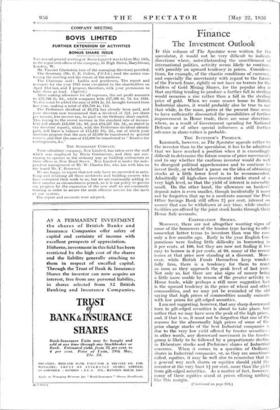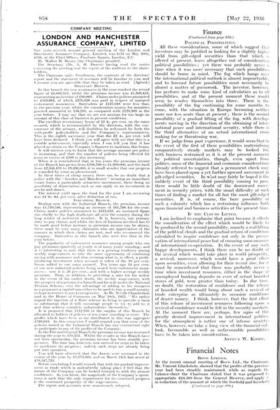The Investment Outlook
Finance
IF this column of The Spedator were written for the speculator, it would not . be very difficult to indicate directions where, notwithstanding the unsettlement of international politics, activity seems likely to continue, with possibly an upward tendency in prices. Considera- tions, for example, of the chaotic conditions of currency, and especially the uncertainty with regard to the future of the French frane, rightly or not have no terrors for the holders of Gold Mining Shares, for the popular idea is that anything tending to produce a further fall in sterling would occasion a rise rather than a fall in the sterling price of gold. When we come nearer home to British Industrial shares, it would probably also be true to say that while, in the mass, prices at the present time seem to have sufficiently discounted the possibilities of further improvement in Home trade, there are some directions where, as a result of Government spending for National Defence or of other special influences a still further advance in share-values is probable.
TEE INVESTOR'S PROBLEM.
Inasmuch, however, as The Spectator appeals rather to the investor than to the speculator, it has to be admitted that we have reached a position when it is exceedingly difficult to determine the future course of price movements and to say whether the cautious investor would do well to disregard political apprehensions and to continue to invest freely, or whether a pause on the idea of obtaining stocks at a little lower level is to be recommended. Admittedly all high-class investment stocks stand at a very high level, so that the yield of interest is miserably small. On the other hand, the allowance on bankers' deposit rates is even smaller, though incidentally it must not be forgotten that up to a moderate amount the Post Office Savings Bank still offers 21 per cent. interest on money that can be withdrawn at any time, while similar facilities are offered by the joint stock banks through their Home Safe accounts.
CORPORATION STOCKS. - Moreover, there are not altogether wanting signs of some of the borrowers of the trustee type having to offer somewhat better terms to investors than was the ease only a few months ago. Early in the year English Cor- porations were finding little difficulty in borrowing in 3 per cents. at 100, but they are now not finding it too easy to borrow in 3 per cents. at 99, many of the recent issues at that price now standing at a discount. More- over, while British.. Funds themselves keep wonder- fully firm, there is a tendency for them to react as soon as they approach the peak level of last year. Not only so, but there are also signs of money being a little more usable by reason of the greater activity in Home trade, while perhaps a still more suggestive fact is the upward tendency in the price of wheat and other commodities, and we may yet be reminded of the old saying that high prices of commodities usually coincide with low prices for gilt-edged securities. I am not suggesting, however, that any sharp downward turn in gilt-edged securities is about to take place, but rather that we may have seen the peak of the high prices. and, if that is so, it must not be forgotten that one of the reasons for the abnormally high prices of some of the prior charge stocks of the best Industrial companies is due to the very low yield offered by trustee securities : in other words, any downward movement in the trustee group is likely to be followed by a proportionate decline in Debenture stocks and Preference shares of Industrial concerns. When it comes to a question of Ordinary shares in Industrial companies, or, as they are sometimes called, equities, it may be well also to remember that in a general way such shares or equities should yield the investor at the very least 11 per cent. more than the yield from gilt-edged securities. As a matter of fact, however. many of these equities stand at prices offering nothing like this margin.
(Continued on-page 958.) Finance -(Continued from page 956.) POLITICAL POSSIBILITIES.
All these considerations, some of which suggest that investors may be justified in looking for a slightly higher yield from gilt-edged securities -than that which i; offered at present, leave altogether out of consideratilth political possibilities ; yet there was probably never a time when it was more necessary that such possibilities should be borne in mind. The fog which hangs over the international political outlook is almost impenetrable, and to forecast future possibilities must necessarily be almost a matter of guesswork. The investor, however, has perforce to make some kind of calculation as to all possibilities, and at the present moment these would seem to resolve themselves into three. There is the possibility of the fog continuing for some months to come, with the situation in Europe becoming neither more nor less acute than at present ; there is the second possibility of a gradual lifting of the fog, with develop- ments moving in the direction of the obtaining of inter- national- peace and international security, while there is the third alternative of an actual international crisis making for or threatening war.
If we judge from past experience, it would seem that in the event of the first of these possibilities materialising comparatively steady markets may be looked for, with business restrained as it is at the present moment by political uncertainties, though, even apart from politics, sonic of the financial and economic considerations already referred to suggest that a permanent cheek may have been placed upon a yet further upward movement in gilt-edged securities. In what may fairly be hoped is the unlikely event of the third possibility coming to pass, there would be little doubt of the downward move- ment in security prices, with the usual difficulty at such► times of finding a market for all but the most gilt-edged securities. It is, of course, the bare possibility of such a calamity which has a restraining influence both upon financial and business activities at the present time.
IF THE CLOUDS LIFTED.
I am inclined to emphasise that point .because it affects the consideration of the effect which would be likely to be produced by the second possibility, namely a real lifting of the political clouds and the gradual return of conditions calculated to inspire confidence not only in the preser- vation of international peace but of ensuring some measure of international co-operation. In the event of any such happy developments, I think there can be no doubt of the revival which would take place in world prosperity. a revival, moreover, which would have a great effect upon securities, even allowing for their recent rise, for it must be remembered that there was probably never a time when investment resources, either in the shape of unemployed banking deposits or even of actual hoarded stores of gold, were greater than today. In due time, no doubt, the restoration of confidence and the release of hoarded wealth would bring about such a revival of trade enterprise as ultimately to occasion conditions of dearer money. I think, however, that the first effect of this release of investment resources following upon a revival of confidence would be felt in the security markets. At the moment there are, perhaps, few signs of this greatly desired improvement in international polities, for the atmosphere is rather one of infense anxiety. When, however, we take a long view of the financial out- look, favourable as well as unfavourable possibilities have to be taken into consideration.
ARTHUR W. KIDDY.



















































 Previous page
Previous page